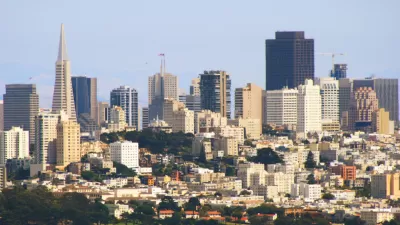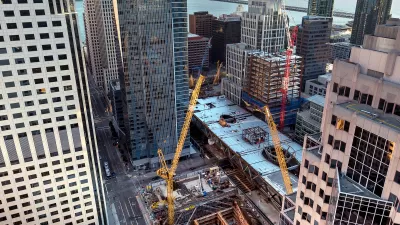Blogger Shane Phillips writes that San Francisco has two possible responses to its housing crisis: increase supply to accommodate newcomers, or hunker down and promote only subsidized housing. Both, he says, are lousy. Other coastal cities, beware.

San Francisco's housing crisis is old news. The new news comes from the almost daily responses from policymakers and stakeholders about what to do with it. The latest is a proposed moratorium on development in the rapidly growing Mission District. This proposal gives blogger Shane Phillips pause, in part because of the economic ramifications of a housing free: "The region may have a lock on the tech sector, but startups for unaffiliated industries would generally be foolish to locate in the Bay Area. San Francisco is on its way to becoming a monolithic populace, not just socioeconomically but commercially as well."
With demand likely to abate around the time Greenland's glacier's refreeze, the city faces two outcomes:
"In one, the supply-siders get their way and lots of new market-rate housing, and a decent share of affordable housing, is built in the Mission and across the city. In the other, the anti-development folks get their way and very little new housing is built in the coming years, with most new construction coming in the form of affordable housing constructed with city, state, and federal funds. The first outcome is extremely bad, the second is utterly disastrous."
This dilemma is important, according to Phillips, because of its ramifications for other attractive, geographically constrained cities.
"San Francisco is a harbinger, but the fate it foreshadows is not an inevitable one, as Tokyo and other cities have demonstrated. Places like Los Angeles and Seattle are on the cusp, and Chicago and Philadelphia are moving in the same direction, but they're all still salvageable. Boston and Washington, D.C. are further along than even LA or Seattle, and they'll have to adopt a regional housing strategy to address housing supply in their regions. This will be considerably more challenging than a go-it-alone approach, but their small size necessitates partnerships with neighboring cities that share responsibility for the affordability and equity of their respective regions."
FULL STORY: San Francisco is Doomed: A Cautionary Tale for Growing U.S. Cities

Alabama: Trump Terminates Settlements for Black Communities Harmed By Raw Sewage
Trump deemed the landmark civil rights agreement “illegal DEI and environmental justice policy.”

Study: Maui’s Plan to Convert Vacation Rentals to Long-Term Housing Could Cause Nearly $1 Billion Economic Loss
The plan would reduce visitor accommodation by 25% resulting in 1,900 jobs lost.

Planetizen Federal Action Tracker
A weekly monitor of how Trump’s orders and actions are impacting planners and planning in America.

Waymo Gets Permission to Map SF’s Market Street
If allowed to operate on the traffic-restricted street, Waymo’s autonomous taxis would have a leg up over ride-hailing competitors — and counter the city’s efforts to grow bike and pedestrian on the thoroughfare.

Parklet Symposium Highlights the Success of Shared Spaces
Parklets got a boost during the Covid-19 pandemic, when the concept was translated to outdoor dining programs that offered restaurants a lifeline during the shutdown.

Federal Homelessness Agency Places Entire Staff on Leave
The U.S. Interagency Council on Homelessness is the only federal agency dedicated to preventing and ending homelessness.
Urban Design for Planners 1: Software Tools
This six-course series explores essential urban design concepts using open source software and equips planners with the tools they need to participate fully in the urban design process.
Planning for Universal Design
Learn the tools for implementing Universal Design in planning regulations.
Caltrans
Smith Gee Studio
Institute for Housing and Urban Development Studies (IHS)
City of Grandview
Harvard GSD Executive Education
Toledo-Lucas County Plan Commissions
Salt Lake City
NYU Wagner Graduate School of Public Service





























